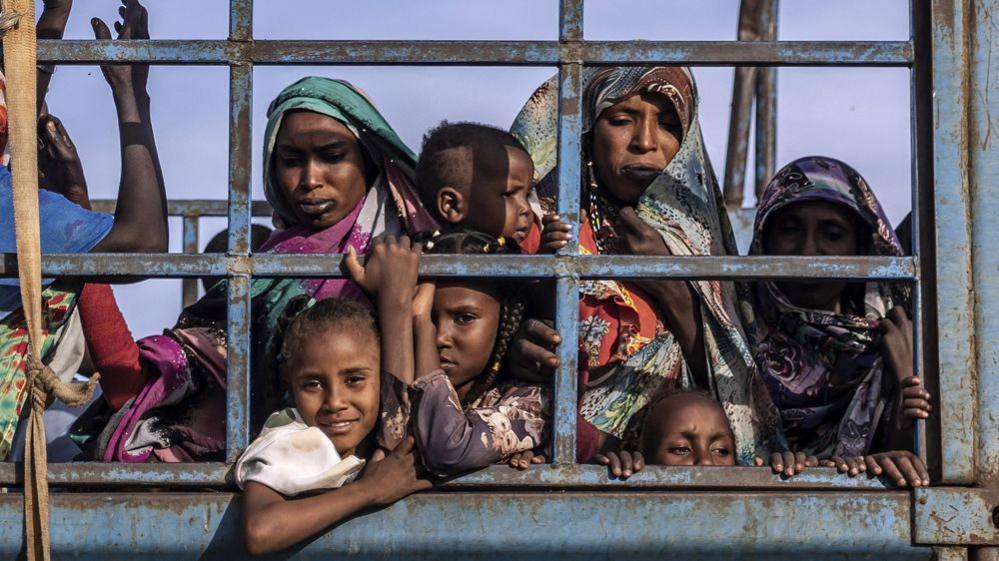Sudan peace talks start - but neither side shows up

Around 10 million people have fled their homes as a result of the war
- Published
Fresh peace talks aimed at ending Sudan's 16-month war have started although neither warring side has entered the negotiating room.
The US, which is leading the talks, insisted the event continued regardless, saying "we are going to try to do everything we can to try to end this horrific crisis in Sudan".
Fighting between the army and the paramilitary Rapid Support Forces (RSF) has killed thousands, driven about 10 million people from their homes and sparked what the United Nations has called the "world's worst hunger crisis".
The army said it would boycott the talks several days ago , while RSF delegates went to Switzerland but at the last minute said they would stay away.
Dashing hopes of a ceasefire, the army said it would not attend as the RSF had not implemented "what was agreed upon" in Saudi Arabia last year.
The paramilitary group had not met key conditions of the Jeddah Declaration, such as withdrawing its fighters from civilians’ houses and public facilities, the army said.
"Military operations will not stop without the withdrawal of every last militiaman from the cities and villages they have plundered and colonised," said Sudanese armed forces chief Abdel Fattah al-Burhan.
The RSF has denied accusations of looting and violence against civilians.
As late as Tuesday night, there were still hopes that Sudan's army would arrive for the talks. Tom Perriello, the US Special Envoy for Sudan, said at 23:30 GMT (00:30 Swiss time) that the delegates were "still waiting on the SAF".
"The world is watching," he posted on X.
Mr Perriello told the BBC that in the absence of both sides, the other parties were "moving forward with the negotiations on everything we can do, to make sure we are getting food and medicine and civilian protection to every person in Sudan".
The RSF on Tuesday night said its arrival in Geneva was "a powerful testament to our resolve and determination to alleviate the suffering of the Sudanese people". The group called on the army to attend the talks.
However, the RSF were not present at the start of the talks on Wednesday. The group has not publicly given a reason for withdrawing.
Before the talks were due to begin, and before the RSF pulled out, Mukesh Kapila, the former United Nations Chief Coordinator for Sudan, said the mood among the delegates was "pretty glum".
"I don't think the two belligerents are interested in talking to each other. One of them is not here already and not much is expected," he told the BBC.
Mr Perriello, however, said he was "very, very hopeful" that the army would listen to "the overwhelming voice of the Sudanese people" and send delegates to Geneva for the talks.
Previous peace talks in Saudi Arabia and Bahrain have all failed.
Delegates from the US, United Arab Emirates (UAE), Saudi Arabia, Egypt, the African Union and the United Nations attended Wednesday's ceremony.
As well as citing the Jeddah Declaration, the army also said it objected to the presence of the UAE as an observer.
The UAE has been accused of arming the RSF, although the Gulf nation has denied any involvement.
The US said the UAE and Egypt - also thought to wield influence in the conflict - needed to attend the talks to help ensure any ceasefire actually holds.
According to the UN’s migration agency, tens of thousands of preventable deaths are looming in Sudan if the conflict and restrictions on humanitarian aid continue.
As talks began in Geneva, medical charity MSF said the last functioning hospital in the besieged Sudanese city of el-Fasher may have to shut down due to intensive bombardment.
The surgical ward in the Saudi hospital was hit on Sunday, killing the carer of a patient and injuring five others, the charity reported.
The Rapid Support Forces have been trying to capture the city from the army for several months, forcing tens of thousands of civilian to flee.
It is the last city still under army control in the western region of Darfur, where the RSF has been accused of widespread atrocities against the region's non-Arabic population.
Additional reporting from Will Ross
Find out more about the Sudan civil war from the BBC:

Go to BBCAfrica.com, external for more news from the African continent.
Follow us on Twitter @BBCAfrica, external, on Facebook at BBC Africa, external or on Instagram at bbcafrica, external